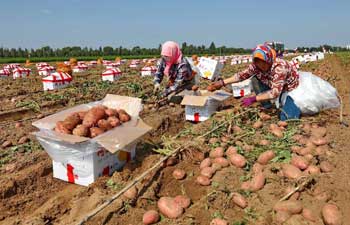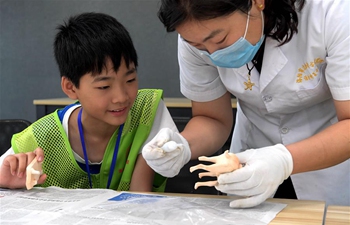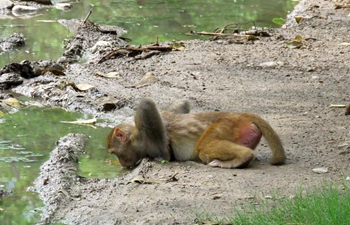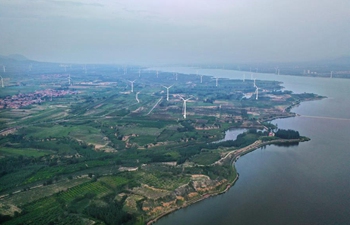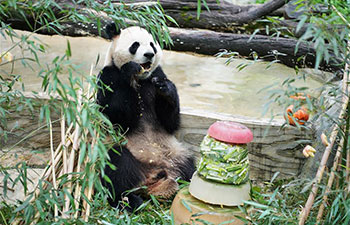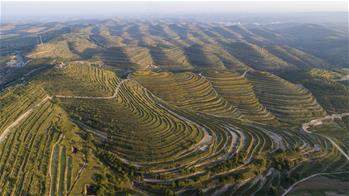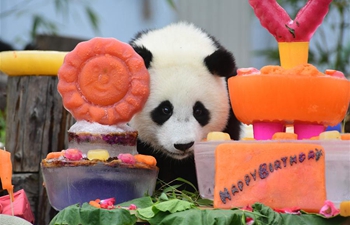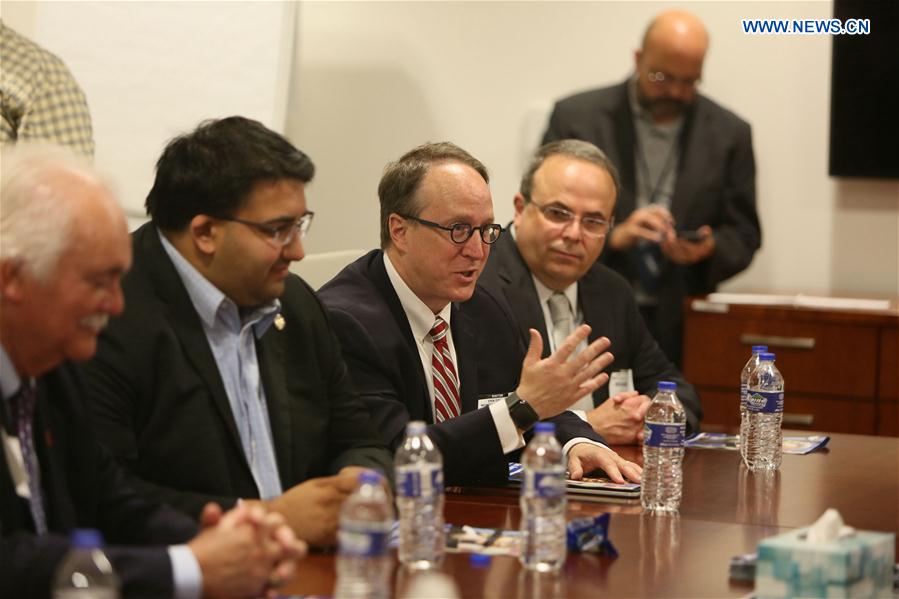
Erik Collins (C), director of Montgomery County Community & Economic Development, speaks during a meeting held in Fuyao factory in Dayton, Ohio, the United States, on July 24, 2019. Government officials, business leaders, cultural exchange associations in U.S. Rust Belt state of Ohio have voiced their willingness to cooperate with their Chinese counterparts in multifaceted ways. (Xinhua/Zhang Fengguo)
NEW YORK, Aug.1 (Xinhua) -- Government officials, business leaders, cultural exchange associations in U.S. Rust Belt state of Ohio have voiced their willingness to cooperate with their Chinese counterparts in multifaceted ways.
ENHANCING BILATERAL TRADE CONNECTIVITY
In a recent conversation with Deputy Chinese Consul General in New York Qian Jin and Fuyao Glass North America President Jeff Liu, representatives of business associations and local governments in Montgomery County applauded the automobile glass manufacturer's move to build a plant in Moraine of Dayton, the county seat.
In 2014, Fuyao acquired a former facility of General Motors (GM) in Moraine, a city in Ohio state, and turned the venue which was shut down amid the 2008 financial crisis into a 2-million-square-feet glass manufacturing plant with a total investment of more than 600 million U.S. dollars.
Niraj Antani, representative of the 42nd district of the Ohio House of Representatives, said the fact that an automobile parts manufacturer came to utilize the same building GM once used and employed so many workers in the area like GM used to do was significant.
The Fuyao investment has brought a great many job opportunities to Dayton and areas nearby.
The plant now employs more than 2,300 people, the vast majority of whom are locally hired, including those who were laid off when GM closed its facility.
For each job that the plant creates, there are two or three more created indirectly along the supply chain, as more people will join component suppliers, logistics companies, construction contractors, and waste management plants, among others.
The local community wants to see more Chinese companies follow in Fuyao's footsteps to come and invest in the county, creating job opportunities, contributing to local tax revenues and helping revitalize the area.
Philip Parker, president of the Dayton Area Chamber of Commerce, said the area has enjoyed not only the investment that Fuyao has made and the charitable deeds Heren Charitable Foundation U.S.A. has done to the community, but also "the possibility of other Chinese investment that we think will come along that can be a synergy that we've seen with other industries with other countries."
Parker took Honda as an example. The company is celebrating the 40th anniversary in Dayton area this year, and the chamber now has 45 Japanese American businesses.
He hopes Chinese companies could do the same.
Mitch Heaton, vice president of economic development at Dayton Development Coalition, said he had recently visited China and spent five days with 11 companies in southeast China's Fujian province.
"We want to help these companies with their globalization efforts," said Heaton.
Representatives of local business and economic development organizations also see more U.S. companies doing businesses with China.
"We know we are a good market for Chinese products. We are glad that the economics are changing in your country so that you become an even better marketplace for us," said Parker, who noted that there are both import and export opportunities between the two sides.
Antani said trade breeds good relationships. As long as the two countries are trading with each other and the two economies depend on each other, the relationship will improve.
Erik Collins, director of Montgomery County Community & Economic Development, said Fuyao took huge risks to come to Dayton area, and the county is working hard to reduce the risk for international companies to do business in the area. He said he wanted the message to be delivered to as many Chinese companies as possible that the region is business-friendly.
STRENGTHENING CULTURAL TIES
Jason Dunn, group vice president of diversity sales & inclusion at the Cincinnati USA Convention & Visitors Bureau, said the city of Cincinnati has been pushing for direct flights to China. Local tourist authorities have also been improving infrastructure to make Chinese people feel welcome.
He believed the city will see more Chinese tourists in the years to come.
Tourism contributes about 5 billion dollars to Cincinnati's economy and the majority of that comes from international travel.
Paul D. Orkwis, interim dean of College of Engineering and Applied Science at the University of Cincinnati, said the university has been strengthening cooperation with its counterparts in China.
The university partnered with China's Chongqing University to launch the Joint Engineering Co-op Institute in 2013, a five-year program in which half the course of study is taught by professors from each university, and the students spend five semesters working at Chinese companies.
There are currently 460 students in the program at the moment. The program has already graduated two classes, each consisting of 56 students. Some 87 percent of the students have gone on to graduate school.
Orkwis said the college views the program as an opportunity not just to get Chinese students to come in, but for American students to have an international experience without having to leave the United States. The college is considering expanding the program to take in as many as 1,000 students.
"It's all about understanding," said Orkwis.
He said the Chinese students are certainly adding to the diversity of the university.
"We are very committed to a global education. We have people from dozens of countries to study in our university. India and China are the biggest suppliers," Orkwis said.
There are about 3,000 students currently studying at the University of Cincinnati, constituting the largest international student community of the university.
Asked whether he is worried about recent tensions between the two countries affecting educational exchanges, Orkwis said there are always ups and downs in relationships, but in the long run, things will get better.
"The more we do exchanges, the more we have students coming and studying here in the United States and see how things are, more understanding grows," said Orkwis.
